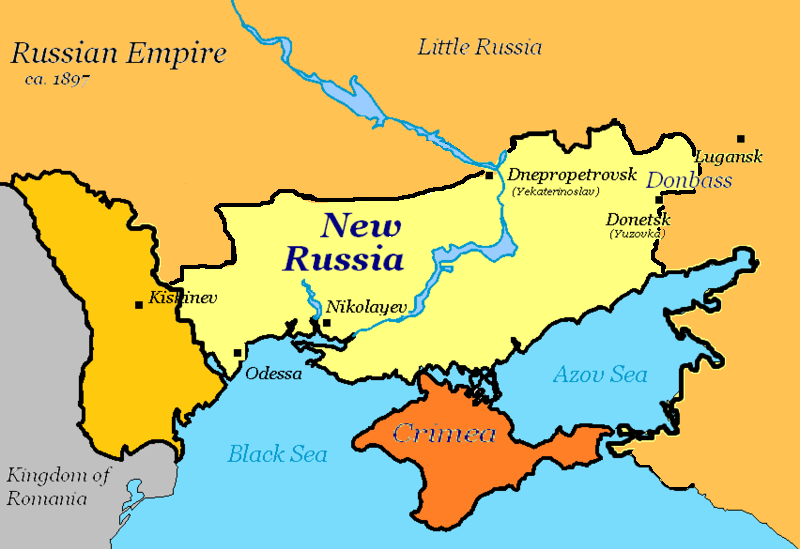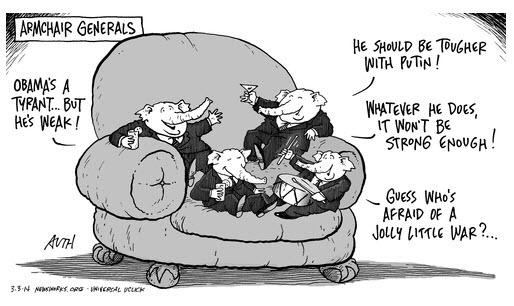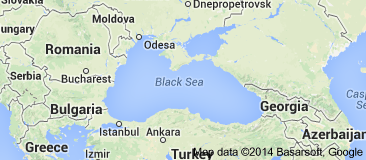Emboldened by West’s Reluctance, Putin Is Poised to Pounce
Putin knows he faces nothing more than further sanctions Apr 18 2014The well-armed and certainly Russia-backed militants that occupy the public buildings in East Ukraine are there for a reason that transcends April 17th's tentative pact, an agreement that makes no provision for Putin to pull back the estimated 40,000 troops massed on the eastern Ukrainian border. It calls for the 
Putin's "New Russia"
streets, squares and occupied buildings to be cleared in return for exploring greater autonomy for Ukraine's regions. But there is no expectation that the insurgents will comply with the order to vacate. It is not their assignment.
Their mission is to wait for the central government in Kiev to use force to remove them. And that is the moment Putin waits for, the moment that will give him the pretext to let loose the troops and invade on the pretext of protecting Russia-allied Ukrainians. Did not the Russian leader, on the same day the agreement was concluded, speak of "Novorossiya" — New Russia? That was the name given to an area conquered by Russia in the 18th Century that embraces all of Ukraine along the Black Sea. It includes the city of Odessa and extends west to the border of Moldova — assumed to be another Putin target. The Russian president sees nothing but sanctions as a penalty for this second land grab. This is the next move we can expect. how did we get here? The world is hardly at peace as this new century unfolds. Death and chaos in Syria, renewed sectarian bombings in Iraq, al Qaeda and the Taliban terrorizing in the name of religion and hatred of the West, rebel armies leaving uncounted dead in the hellholes of Africa. And now, just as the United States prepares to draw away from a Middle East written off as hopeless to deal with the rising territorial belligerence of China (and a psychotic North Korea), a new threat has arisen as Vladimir Putin decides that Russia must resurrect itself as a great power.
The patterns that will shape the 21st Century are being spread out before us, and their design is increasingly ugly. How things are turning out seems to mock us for celebrating an anticipated “peace dividend” in the ‘90s after the collapse of the Soviet Union. Instead we left behind a 20th Century that resolved much less than we thought.
Speaking before European Union officials in Brussels, President Obama voiced a similar lament:
”Russia's leadership is challenging truths that only a few weeks ago seemed self-evident, that in the 21st Century the borders of Europe cannot be re-drawn with force...That...would ignore the lessons that are written in the cemeteries of this continent. It would allow the old way of doing things to regain a foothold in this young century."
We have ourselves to blame for much of Russia's combativeness. When the Soviet Union came apart, the triumphalist attitude the U.S. adopted was disappointing and foolish. The United States, widely esteemed for its Marshall Plan, the enlightened policy that helped to rebuild a defeated Germany, this time put the screws to its former adversary, a policy analogous to the mistakes made after the First World War, when the Treaty of Versailles forced the reduction of Germany’s military, the destruction of its armaments, payment of reparations from bankrupt coffers, and dispersal of pieces of the country to others (Alsace-Lorraine, Sudetenland) — punitive measures that set the stage for a leader to come along who would rally its people to restore pride in their nation through conquest.
That is not unlike what we have helped to create with Mr. Putin. The U.S. and Europe took advantage of a weakened Russia after the disbanding of the Soviet Union to expand what had been the North Atlantic Treaty Organization well to the east. From the Russian viewpoint, the West has sought to surround Russia with NATO, which now comprises 28 countries, more than twice the original dozen, several having even defected from Russia’s counterpart, the Warsaw Pact, and a couple of them — Estonia and Latvia — right up against Russia’s northern borders, with a third, Lithuania, inches away. We then placed missile defenses in those eastern reaches, avowedly as a deterrent against Iran. Russia did not view them that way.
These senseless provocations by the Bushes and Clinton showed a remarkable ignorance of Russian paranoia, its historical fear of a cordon sanitaire, as a repeatedly invaded country (Napoleon, Hitler) that had by far the greatest loss of life in World War II. The western bully inspired in Putin an unyielding hatred for the United States that we heard in his speech that announced the annexation of Crimea to the country’s legislators and top officialdom:
“They cheated us again and again, made decisions behind our back, presenting us with completed facts...That’s the way it was with the expansion of NATO in the East, with the deployment of military infrastructure at our borders. They always told us the same thing: ‘Well, this doesn’t involve you.’”
Ukraine was the latest chapter. The U.S. and Europe meddling in Russia’s backyard, its “close abroad” sphere of influence, Kiev being the “the mother of Russian cities” where Russia itself took root, was an outrage for Putin and his cohort — a further encirclement, this time a move up against Russia’s southwest. “They see it as an erosion of their buffer zone, a further Western incursion into their natural sphere of influence”, says Kathryn Stoner, a Russia expert at Stanford University. “It would be like Russia going to Mexico and saying to the Mexican president, we stand with you against the U.S.”. When we vied along with the European Union to woo Ukraine away from ties with Russia, that only confirmed that the West is what Vladimir Yakunin, an adviser to Putin and head of Russian Railways, called a “global financial oligarchy” that wants continued domination of the world economy at Russian expense. Another member of what might be called Russia’s neocons, Aleksandr Dugin, said that “Anti-Americanism has become the main ideology, the main worldview among Russians. There will never be another ‘reset,’ ever.”
what’s next?America’s concern is that Putin will not stop, that he will claim that ethnic Russians in other enclaves such as the Baltic states are threatened, that he will claw back pieces of the last century’s empire. Like a de Gaulle, he regards himself as the personification of Russia, destined to make history by restoring his country’s greatness. His decisive action in Crimea has caused his popularity to soar at home, stirring a nationalist pride that has eclipsed the shouts of “Putin is a thief” and “Russia Without Putin” by tens of thousands in December 2011 street protests after what was considered his rigged re-election.
For Crimea he cites the same arguments that NATO did to justify the independence of Kosovo to protect its population from Serbia’s infamous “ethnic cleansing”. Germany’s Chancellor Angela Merkel called “shameful” Putin’s comparing the threat to Crimea’s Russians to NATO's Kosovo intervention, which occurred only after years of actual atrocities. Such fabrications have shown that he can’t be trusted. There were no such threats. He then denied that the unmarked troops that invaded were Russian. The thousands of troops massed at the border of southeast Ukraine are there only for "exercises", he and his generals claim, a curious choice of location in a nation of 6.6 million square miles. Most serious, he abrogated the Budapest Memorandum, signed by Russia, the United Kingdom and the U.S. in 1994 that guaranteed Ukraine’s sovereignty in exchange for its surrendering its nuclear weapons. Putin claimed that the ouster of the staggeringly corrupt Ukrainian president voided the pact, as if Yanukovych was Ukraine.
Who lost Crimea?Like the drone of a Greek chorus telling the audience the back story of how the tragedy unfolded, politicians and pundits on the right want to make sure we know that it is Barack Obama’s weakness that led Vladimir Putin to expropriate Crimea and append it to Russia.
Never mind the sequence of events: Yanukovych committed his country to join Russia’s trade alliance, ditched the compact with the European Union that the public wanted, ignited months of rioting and burning in Maidan Square. The insurgents sent him fleeing, seized parliament, set up a new government absent representation of eastern Ukraine where ethnic Russians mostly live, then revoked a law that had allowed general use of the Russian language, and introduced a bill that would ban Russian from the media, with the neo-Nazi rightists wanting to strip Russian speakers of Ukrainian citizenship.
For Putin this was an anti-Russian coup on its border. Events led him to make sure Crimea, long historically part of Russia, would return there and its 60% ethnic Russian population be repatriated. When Putin broke off pieces of Georgia, just as he didn’t give a thought to the aggressive George W. Bush (certified as non-weak by the war hawks even though he took no action), neither did he give a thought to Obama. Journal columnist Peggy Noonan got it right: “Mr. Putin didn't go into Ukraine because of Mr. Obama. He just factored him in”.
Yet it became the settled consensus that Obama’s failure to launch cruise missiles against Syria’s al-Assad regime told Putin he could act with impunity. “When the leader of the world's only superpower issues a military ultimatum and then blinks, others notice”, said The Wall Street Journal. ( Forgotten is that, unlike Bush in Afghanistan and Iraq, Obama lacked the support of the United Nations, usually reliable Britain, the American public, and a Congress that, after a long lapse, exerted its constitutional right to declare war and then refused Obama’s request. He would have been going into Syria entirely on his own. A vote for impeachment surely would have followed.)
manning up The universal accusation that he is weak may now be causing Obama to take overly provocative actions, sending F-16s into Latvia and warships into the Black Sea as if to placate his critics. In the same speech quoted above Obama said,
"What we will do always is uphold our solemn obligation, our Article 5 duty to defend the sovereignty and territorial integrity of our allies and in that promise we will never waver. NATO nations never stand alone.
No equivocation there.
The armchair warriors, leading from behind, are in full throat. William Kristol, publisher of the conservative Weekly Standard magazine, has never 
worn a uniform but tells us we must not allow our war-weariness to be an excuse for not “shouldering our responsibilities”.
The Wall Street Journal’s editorial page calls for a “renewed military deterrent”, which “does not mean a strike against Russia”; rather, just the sort of paranoia-inducing moves that could prod Russia to strike instead. We are exhorted to move “quickly to forward deploy”, “permanently stationing forces in Poland and Romania as well as the Baltic states of Estonia, Latvia and Lithuania”, “troops in addition to planes and armor”, revive the “Bush-era missile defense installation in Eastern Europe” and “deploy ships from the Europe-based Sixth Fleet into the Black Sea”, thus directly confronting the Russian fleet at Sevastopol 
in a closed-off body of water like scorpions in a bottle. How to start a war.
Russia's Defense Minister Sergei Shoigu now says Russia plans to use military bases in Cuba, Venezuela and Nicaragua for its navy and to refuel strategic bombers. Tit for tat.
Patrick Buchanan, a conservative who once sought the Republican presidential nomination, regularly chastises America for its foreign entanglements at his website. He makes the point that, across the 45-year span of the Cold War, five U.S. presidents took no action against Russia for anything they did east of the Elbe River. They…
”ruled out force during the Berlin Blockade of 1948, the Hungarian Revolution of 1956, the building of the Berlin Wall in 1961, the Warsaw Pact invasion of Czechoslovakia in 1968, and the smashing of Solidarity in Poland in 1981.”
But we are now well east of the Elbe. With NATO’s aggressive push eastward we have now guaranteed the security of the Baltic States smack on Russia’s border. Much like Crimea, they have substantial ethnic Russian populations and are just what Mr. Putin would like to re-possess in his drive to rebuild a Russian empire.
Having painted ourselves into that far corner, we need ask just how strong is NATO’s resolve, should that be Putin’s next step? We are watching European diffidence to even invoke economic sanctions, fearful of a Russian cut-off of natural gas on which Europe relies, and anxious about consequences to thousands of Euro-owned businesses set up in Russia over the last quarter century. And there's this to consider: “In the United States, one man takes a decision on the basis of an executive order”, said Poland’s foreign minister, Radoslaw Sikorski to journalists, “whereas in Europe...we need a consensus of 28 member states”. Well, not quite, but...
Given the awkwardness of a bloated NATO and its questionable military readiness, Putin may well be tempted to test Europe’s resolve in the Baltics. “The U.S. is from Mars and Europe is from Venus. Get used to it”, Sikorski added. Douglas Feith, a former under-secretary of defense, raised a discomfiting specter in a Journal op-ed. “The Russian leader could perceive a rare opportunity to wreck NATO”.
Please subscribe if you haven't, or post a comment below about this article, or
click here to go to our front page.

